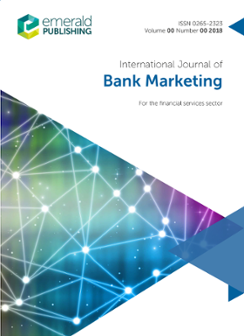Social performance, financial risk and financial performance in microfinance institutions
IF 6.9
3区 管理学
Q1 BUSINESS
引用次数: 1
Abstract
PurposeThis paper examine whether social performance moderates the linkage between financial risk and financial performance in microfinance institutions (MFIs). The study focuses on the financial self-sufficiency and long-term sustainability of MFIs.Design/methodology/approachThe empirical study uses unbalanced panel data of 2,694 worldwide MFIs from 2009 to 2019. In the first step, the study inspects the impact of social performance and risk on financial performance, proxied as return on assets and operational self-sufficiency. In the second stage, moderated hierarchical regression is applied to test whether social performance moderates the relationship between risk and financial performance. Lastly, the study confirms the significant moderation effects with slope tests.FindingsThe study detects robust evidence that financial risk is negatively related to financial performance. Though social performance exhibits a weak positive link with financial performance in silos, the evidence of its moderating effects on risk is mixed and significant. Social performance indicators, such as the borrower retention rate and female representation, positively moderate the relationship between financial risk and financial performance. The study documents that social performance impacts financial performance and operational self-sufficiency through risk moderation. Thus, social performance fosters the sustainability of these institutions over the long haul.Research limitations/implicationsThe study is relevant to academics and theorists to consider the stakeholder approach in microfinancing. In the context of stakeholder theory, the study advances the specific social responsiveness process, namely stakeholder engagement.Practical implicationsThe evidence that socially sensitive operations can curtail the adverse effects of credit risks on financial performance signify the required attention to social performance. For MFI managers and practitioners, the findings justify the business case for social performance. Stakeholder engagement, under the auspices of social responsiveness, acts as a risk-mitigation mechanism to eventually foster financial performance and self-sufficiency.Social implicationsThe study motivates MFIs to do more for their stakeholders and society by highlighting the benefits of social performance.Originality/valueThe study reaffirms that social performance remains at the epicenter of the MFIs' mission and is an essential risk mitigation mechanism. The study adds to the extant literature on stakeholder engagement and its effects on MFIs.小额信贷机构的社会绩效、财务风险与财务绩效
目的研究社会绩效是否调节小额金融机构财务风险与财务绩效之间的联系。该研究侧重于小额金融机构的财务自给自足和长期可持续性。设计/方法/方法该实证研究使用了2009年至2019年全球2694家小额金融机构不平衡的面板数据。第一步,研究考察了社会绩效和风险对财务绩效的影响,表现为资产回报率和运营自给自足。在第二阶段,采用有调节的层次回归来检验社会绩效是否调节了风险与财务绩效之间的关系。最后,该研究通过边坡试验证实了显著的缓和效应。发现该研究发现了强有力的证据,表明财务风险与财务业绩呈负相关。尽管社会绩效与财务绩效之间存在微弱的正相关,但其对风险的调节作用的证据是喜忧参半的。社会绩效指标,如借款人保留率和女性代表性,积极调节财务风险与财务绩效之间的关系。该研究记录了社会绩效通过风险调节影响财务绩效和运营自给自足。因此,社会绩效促进了这些机构的长期可持续性。研究局限性/含义该研究与学者和理论家考虑小额融资中的利益相关者方法有关。在利益相关者理论的背景下,本研究提出了特定的社会响应过程,即利益相关者参与。实际含义社会敏感业务可以减少信贷风险对财务业绩的不利影响的证据表明,需要关注社会业绩。对于小额金融机构的管理人员和从业者来说,研究结果证明了社会绩效的商业案例是合理的。利益相关者的参与,在社会响应的支持下,作为一种风险缓解机制,最终促进财务绩效和自我效能。社会影响该研究通过强调社会绩效的好处,激励小额金融机构为其利益相关者和社会做更多的事。原创性/价值该研究重申,社会绩效仍然是小额金融机构使命的核心,是一种重要的风险缓解机制。该研究补充了现有的关于利益相关者参与及其对小额金融机构影响的文献。
本文章由计算机程序翻译,如有差异,请以英文原文为准。
求助全文
约1分钟内获得全文
求助全文
来源期刊

International Journal of Bank Marketing
BUSINESS-
CiteScore
10.70
自引率
18.90%
发文量
54
期刊介绍:
International Journal of Bank Marketing (IJBM) aims to publish papers that relate to the marketing challenges of financial services providers around the globe.
Preference is given to empirically-based research papers that expand on existing theories (or develop new ones) on customer behaviour in financial services settings.
In addition, the journal is interested in helping academicians and practitioners in the field to better understand the discipline of financial services marketing, and as a result review papers and thought pieces are invited for submission.
 求助内容:
求助内容: 应助结果提醒方式:
应助结果提醒方式:


